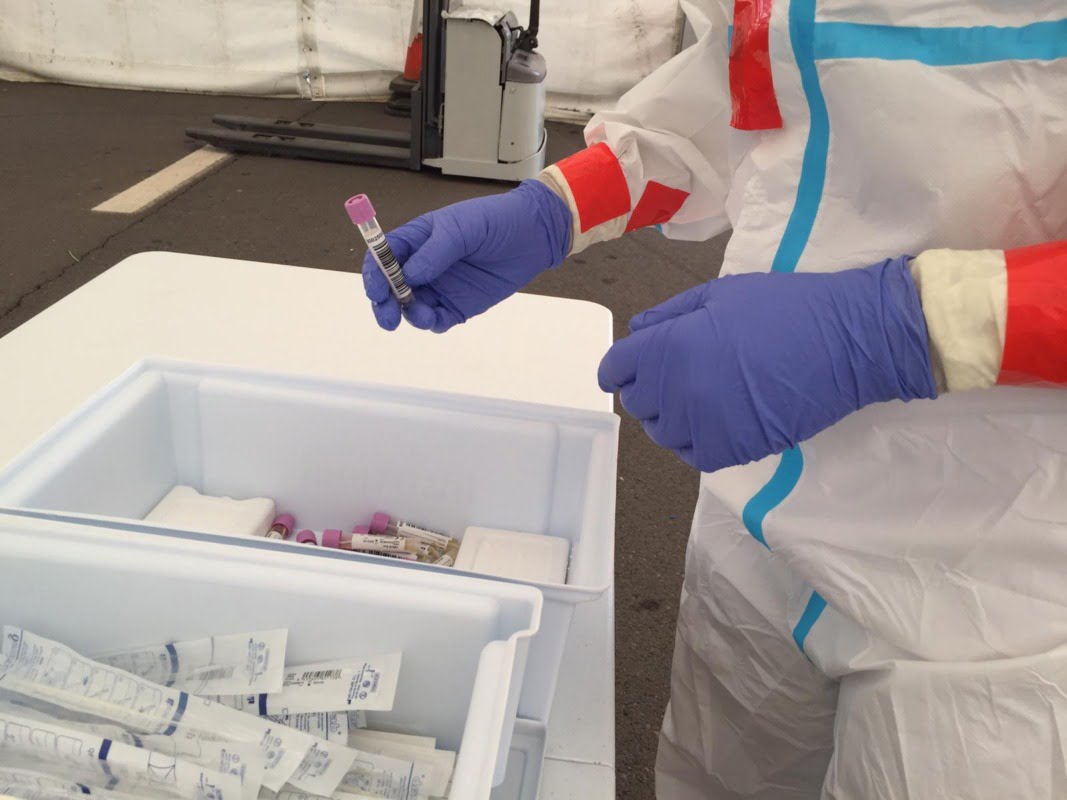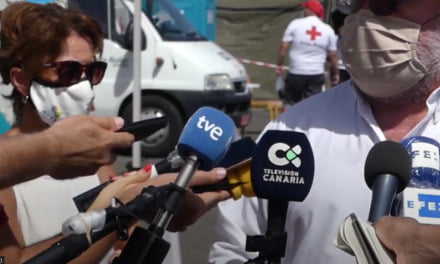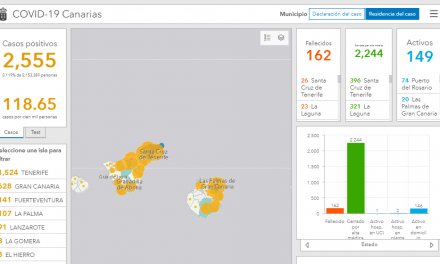The Canary Islands Ministry of Health on Tuesday registered 148 new cases of coronavirus COVID-19. The total accumulated cases in the Canary Islands now stands at 50,972 with 4,194 active, of which 84 are in the ICU and 324 remain hospitalised. Infection rates appear to be dropping on Gran Canaria, though Tenerife is still struggling.
For the latest Canary Islands data on Covid-19, updated daily, check our Canary Islands dashboard
The 7-day Accumulated Incidence (AI), for infection rates in the Canary Islands, now stands at 63.33 cases per 100,000 population and at 14 days 136.86 cases per 100,000. To date, a total of 1,019,878 PCR tests have been carried out in the Islands, of which 3,042 were in the last 24 hours.
On the island of Gran Canaria things are starting to look better, after a worrying few weeks that followed the easter break, the level 3 restrictions in place since march at last seem to be lowering the infection rates of new coronavirus cases, with now a third consecutive day of decreasing numbers, and fourth hoped for on Wednesday, health experts are now predicting this to be a clear beginning to a slow down that, so long as the trend continues, will bend contagion curve down in the right direction, but there are still serious concerns on Tenerife. The combined Canary Islands data, published on Tuesday, records just 148 new cases in the archipelago, which is to say 55 less than on Monday. 96 of yesterday’s reported infections were registered on Tenerife and just 43 on Gran Canaria, raising hopes that Gran Canaria is now inching closer to level 2 once more. The primary issue of concern now is the continuing pressure on the healthcare system, particularly in intensive care units.
On Tenerife the infection rates still refuse to ease and, according to Antonio Sierra, a member of the Canary Islands Covid-19 scientific committee, this has been primarily due to a failure to comply with the health measures and restrictions. “Irresponsibility” he said “is more harmful than the British strain, if there were no irresponsibility it would be stopped with the barriers that we put in place through protections or restrictions.” Sierra’s reference to the so-called “British strain” is based on data that shows 88% of all new recent infections on the islands are currently due to the more virulent variant B1.1.7, first identified in the UK, and which now accounts for the vast majority of new infections throughout Spain and the Canary Islands.
A professor of microbiology, Sierra is in favour of tightening the restrictions by increasing the penalties for breaking the rules, “because if they were met, we would not be in this situation” he said.
46,066 Patients Recovered
- Over the last 24 hours there were 405 medical discharges issued for Covid-19 patients, bringing the total recorded number of patients who have overcome the coronavirus on the Islands to 46,066.
Sierra emphasised infection rates within families, calling for a continued and responsible sense of caution, if we are to continue curbing the pandemic on the islands while the vaccinations program continues to be rolled out. “There are significant breaches of restrictions, and the individual protection measures are basic and simple, but they are not complied with in many cases. This leads to a spread of the virus, with outbreaks, especially among family members, because in private homes there is coexistence with non-partners, there are relationships, and it is easily transmitted by not respecting the masks, distance and hygiene measures ”.
Fines
Sierra insists that, “when people do not respond out of conscience, because of responsibility, to the number of serious patients and deaths”, the sanctioning and fines procedures have to “to be effective”, offering as an example the Traffic model, which has managed to significantly reduce accidents and the level of mortality on the roads “with sanctioning procedures and their relentless execution.”
According to the data provided by the Ministry of Health, the Canary Islands on Tuesday recorded 148 new infections compared to 203 on Monday, which brings us to a cumulative total of 50,972 cases of coronavirus since the pandemic began. Gran Canaria is the island that has improved the most in terms of incidence, with downward trending data for a fourth consecutive day, the number of new infections having nearly halved from 85 new cases on April 16 to 48 new cases on April 20. Tenerife however registered 154 new cases on the 16th, a number which had risen to 123 on the 19th and the 96 on Tuesday. Tenerife has so far seen 21,754 accumulated cases since the health crisis started with 2,367 active; while Gran Canaria has dealt with 21,111 accumulated and still has 1,569 active. Between them representing 63.4% of all active cases in the archipelago.
As for the other islands, Lanzarote added six new cases on Tuesday, to total 4,839 so far accumulated and 120 currently active; Fuerteventura has had a total 2,211 accumulated cases, having detected just one new case since Monday and 96 still active; La Palma, had two more, having accumulated 500 in total with 11 active; El Hierro did not add cases yesterday, and has had 329 in total with 29 active; and La Gomera has added no new infections having seen just 227 cases in total and one still active.
 It should be noted in the data that El Hierro looks like they have had a huge increase in recent days, this is due to just one new outbreak detected over the weekend, affecting less than 30 people, but because of their small population the impact on the graph looks much more worrying that it actually is. A similar effect can be seen in El Hierro’s data from the end of January.
It should be noted in the data that El Hierro looks like they have had a huge increase in recent days, this is due to just one new outbreak detected over the weekend, affecting less than 30 people, but because of their small population the impact on the graph looks much more worrying that it actually is. A similar effect can be seen in El Hierro’s data from the end of January.Sierra reinforced the message of how important it still is to comply with health measures to try to continue bringing infection rates down, with only 20% of the population currently immunised. “The virus is easily transmitted, the asymptomatic forms are many and go unnoticed, as well as many mild cases and still around 80% of the population is not immunised from having had the disease or having had the vaccine. In the last month we have had numbers that, although below the national average, have risen, and what is expected is that with the increase in vaccinations we will see less, but there is still a tough phase [ahead] given the conditions of the virus and the population.”
After the 405 medical discharges recorded on Tuesday, the total active cases now on the Islands stood at 4,194, of which 3,786 patients are being monitored in their homes, which is to say 257 less than on Monday; 324 are hospitalised on the wards, three more than the day before, and 84 are in ICUs, four less than on Monday, but representing more than 20% of the total available.
712 people have lost their lives as a result of the pandemic in the Archipelago, overwhelmingly they are patients who presented with previous medical conditions.
The Canarian municipalities with the highest numbers of active cases at present are Las Palmas de Gran Canaria with 1,403; followed by Santa Cruz de Tenerife with 1,258 and La Laguna with 545. The two Canarian capital islands account for 63.4% of patients with coronavirus in the archipelago.

#StopBulos If you are called by phone, on behalf of the Ministry of Health, asking you a questionnaire about #COVID19 and, as a reward, they offer you to disinfect your house, DO NOT ACCEPT.
Si te llaman por teléfono en nombre de la Consejería de Sanidad haciéndote un cuestionario sobre #COVID19 y, como premio, te ofrecen desinfectar tu casa, NO ACEPTES❌
‼️Es una estafa ‼️ https://t.co/u1YDcJvHfn
— Sanidad Gobcan (@SanidadGobCan) April 21, 2021
The Canary Islands vaccination teams have administered 499,367 doses of vaccines against #COVID19.
Up until Monday, 127,306 people have already received both doses of the vaccine and been immunised, representing 6.8% of the target population (1,871,033 people).
?Los equipos de vacunación de Canarias han administrado 499.367 dosis de la vacuna contra la #COVID19. Hasta ayer se había inmunizado a 127.306 personas que ya han recibido las 2 dosis de la vacuna, lo que supone el 6,8% de la población diana (1.871.033 personas). pic.twitter.com/3ldWKYGsQV — Sanidad Gobcan (@SanidadGobCan) April 20, 2021
Health Ministry confirms 148 new cases of #COVID19 in the last 24 hours.
Until Tuesday, 1,019,878 PCRs have been carried out, of which 3,042 were on Monday
?Por islas, así se distribuyen los casos acumulados?? pic.twitter.com/YaIVamIizM
— Sanidad Gobcan (@SanidadGobCan) April 20, 2021













